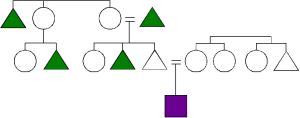![]()
![]()
![]()
![]()
![]()
![]()
![]()
![]()
![]()
masōwaron
one’s paternal uncle, paternal grandfather, one’s father’s brother or father, any of one’s father’s male relatives of the same generation or older. One’s masōwaron is not part of one’s clan. Unlike other terms, masōwaroni can be in multiple generations. So, the green triangles are the purple square’s masōwaroni.

I’ve seen a number of these terms now, and I just have to ask: Can you use this system? Not in general, I mean you. I get totally lost. (Of course, this is true of English’s system, too. I have no idea how to describe how some of my relatives are related to me. I overuse the term “relative” to cover.)
I would not have dared to ask, but have to admit that to me, it is highly confusing as well.
Yes. Except, I don’t want to name names. So…
I have one matiē, no makāji.
On my mother’s side of the family, I have only my mother, two mawēsi, and one mārjanen. My aunts (married to my uncles on my mother’s side) would not be considered kin under this system – they’d have their own clans. Likewise, my uncles’ children would be in their mother’s clans. So they’d all be my maþūskīri.)
On my father’s side, I have three mapāranni.
This system isn’t designed for nuclear families. It’s designed for groups that live in matrilineal clans, such that if my grandmother had sisters, they would also be part of my clan, and so would all their descendants.
The confusing part is whether or not marriage brings people into the clan or not. So, one could say that my mother’s brother’s were no longer part of my clan but instead were part of their wives’ clans. Same with my father’s sister’s husbands. If they are part of my father’s clan, then they count as masōwaroni.
Clear as mud, now? 🙂
OK. Here is something else that might help:
http://www.terjemar.net/kinship.php